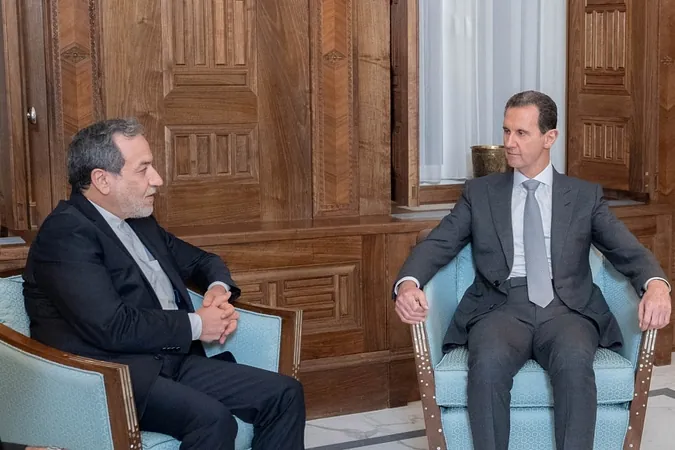
Chaos in Aleppo: Assad's Grip Weakens as Rebels Take Control
2024-12-02
Author: Sarah
Introduction
In a shocking turn of events on December 1, Syrian President Bashar al-Assad made urgent appeals for support from his allies in light of a recent catastrophic loss in Aleppo, a city long regarded as a stronghold of government power. For the first time since the onset of the Syrian civil war over a decade ago, an Islamist-dominated rebel coalition has seized control of Aleppo City, leaving regime forces scrambling to regain their footing.
The Outbreak of Rebellion
The rebellion erupted shortly after a fragile ceasefire was declared in neighboring Lebanon, coinciding with a brutal offensive launched by the jihadist group Hayat Tahrir al-Sham (HTS) and its allies on November 27. The Syrian Observatory for Human Rights reported that government forces no longer control any part of Aleppo outside of Kurdish-held neighborhoods, marking a pivotal shift on the battlefield.
Iran's Reaction
Iranian Foreign Minister Abbas Araghchi flew to Damascus on the same day to reassure Assad of Tehran's unwavering support for the Syrian government and military. Following their meeting, Assad underscored the necessity of international backing in combating what he termed 'foreign-backed terrorists.'
Counteroffensive Efforts
In a desperate bid to counter the rebel advance, both Syrian and Russian air forces conducted airstrikes aimed at insurgent positions. Reports indicated that the strikes resulted in the deaths of at least 12 individuals in Aleppo and nine in Idlib, a region that has previously been a stronghold of opposition in Syria. Images from local hospitals displayed scenes of devastation, with civilians caught in the crossfire—one woman lamented the death of her daughter-in-law, who left behind five children.
Comparing to Past Conflicts
This recent descent into chaos is reminiscent of 2016 when a combination of Russian air support and ground forces allowed the Syrian army to recapture key areas of Aleppo. However, the landscape has transformed significantly since then, with HTS expanding its control over larger territories, including areas previously held by the regime.
Humanitarian Crisis
The plight of civilians and humanitarian concerns have been exacerbated by continuing airstrikes and ground assaults. The latest confrontations have already resulted in over 412 casualties, primarily among combatants but with significant civilian losses as well. Many locals in Aleppo have been left fearing for their lives, resulting in a notable escalation of chaos and despair.
Analysts' Insights
Analysts have noted that the latest developments in Aleppo serve as a stark reminder of the regime's fragility. Aaron Stein from the US-based Foreign Policy Research Institute highlighted that Russia's military presence in the region has diminished, raising questions about the sustainability of Assad's regime without robust support from allies.
Regional Implications
Moreover, the conflict has sparked further skirmishes in northern Syria, with pro-Turkey factions battling Kurdish fighters in Aleppo province, further complicating an already precarious situation. The United Nations has labeled these developments as potentially threatening regional and international stability, echoing concerns from various global players regarding the deteriorating humanitarian conditions on the ground.
Conclusion
As the balance of power continues to shift, Assad's government finds itself at a crossroads: regain control or face further disintegration, with the potential collapse of its authority hanging precariously in the balance. With regional stakes higher than ever, the world watches closely, waiting to see just how far the embattled Syrian state can endure.




 Brasil (PT)
Brasil (PT)
 Canada (EN)
Canada (EN)
 Chile (ES)
Chile (ES)
 España (ES)
España (ES)
 France (FR)
France (FR)
 Hong Kong (EN)
Hong Kong (EN)
 Italia (IT)
Italia (IT)
 日本 (JA)
日本 (JA)
 Magyarország (HU)
Magyarország (HU)
 Norge (NO)
Norge (NO)
 Polska (PL)
Polska (PL)
 Schweiz (DE)
Schweiz (DE)
 Singapore (EN)
Singapore (EN)
 Sverige (SV)
Sverige (SV)
 Suomi (FI)
Suomi (FI)
 Türkiye (TR)
Türkiye (TR)